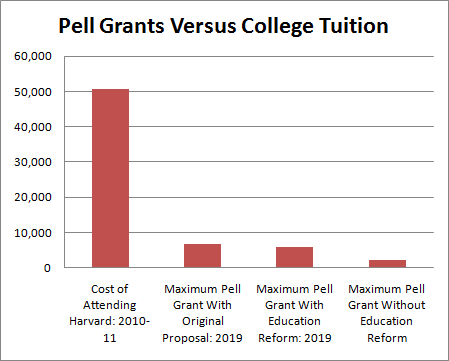By: Inoljt, http://mypolitikal.com/

When Congress passed the health care bill, with it came a momentous education reform. Signed into law by President Barack Obama, its intention was to help relieve the ever-rising burden imposed by soaring college fees and tuition rates.
This reform was funded by ending a government subsidy to big banks in the business of student loans. Money for poor people to attend college was expanded. Money was also saved by ending these government subsidies.
Under the previous system, the government ensured that student lenders would always make money; if students defaulted on their loans, the government would pay the money to the student lenders. In a CBS 60 minutes report, think tank expert Michael Dannenberg characterized this as:
a socialist-like system,” he says. “It’s not as if this private entity is assuming any risks. No, no, no. The law makes sure that this so-called private entity has virtually no risk.”
Unfortunately for students, this lucrative government-funded industry did relatively little to benefit them.
More below.
Take a look at Sallie Mae, perhaps the biggest player in the student loan industry. Sallie Mae’s loans carry a variable interest rate, which right now appears to be 10.55%. In addition it charges a disbursement fee of 3%; other banks have similar fees.
Such practices can make already high student debt astronomical. Take Brit Napoli, who originally borrowed $38,000. According to the CBS report, that loan has ballooned to $71,000. College graduate Lynnae Brown’s $60,000 loan has jumped to an astounding $262,383 after she fell behind in payments.
Education reform was intended to help people like Brit Napoli and Lynnae Brown. Subsidies for big banks and corporations like Sallie Mae were ended. Money for poor people to attend college was expanded. Money was even saved by ending these government subsidies.
The special interests fought every step of the way. They lobbied. They waved cash at Senators. They argued that their jobs were at stake (therefore the bill would “take away jobs”), and that teenagers deserved more choices. In the end, they succeeded in vastly weakening the original ambitions embodied in education reform.
The original bill envisioned a rise in maximum Pell Grants – federal money for low-income students to attend college – from $5,350 today to $6,900 in 2019. Interest on federal student loans was to remain relatively low: 3.4% past 2012 (compare that with Sallie Mae’s 10.55%). Money was to be invested in early childhood education, community colleges (the American Graduation Initiative) and a College Access and Completion Fund. Federal Perkins loans were to be reformed “to reward institutions for their success in graduating low-income students.”
By the time special interests were done with the bill, almost all of this was gone. That increase in Pell Grants – it’s now only up to $5,975, a paltry $62.50 per year. In other news, Harvard College increased its tuition by $1868 for the 2010-2011 year (for a total cost of $50,724).
As for federal student loans: in 2013 the interest rate goes right back up to 6.8%. Investment in community colleges was cut by 80%. Reform of Perkins loans, investment in early childhood education, and the College Access and Completion Fund were scrapped altogether.
This is not to say that education reform has been a miserable failure. Without it, things would be far worse. The maximum Pell Grant would have decreased to $2,150 – or 4.2% the cost of attending Harvard for one year. Community colleges still get some money. Investment in historically black colleges hasn’t been cut. The government will no longer protect lenders who prey on unsophisticated students.
But boy did the special interests succeed in gutting a wonderful bill. The saddest part, moreover, is that their efforts were all pointless. All the lobbying, all the money thrown at Senators like Ben Nelson (Neb.) and Kent Conrad (ND) – it only served to delay the bill. The government subsidies which Sallie Mae so desperately protected are gone. In the end, the only thing the special interests were able to do was make college more unaffordable for millions of poor Americans.

5 comments